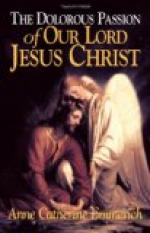great as would naturally have been expected, because
the strictest order and decorum were always enforced
there, particularly with regard to the regulation to
be followed by those who entered to make their sacrifice,
and those who left after having offered it. The
crowd was great, but the ceremonies were so solemnly
carried out by the priests, that they totally engrossed
the minds of the assistants. First came the immolation
of the lamb, then the sprinkling of its blood, accompanied
by the chanting of canticles and the sounding of trumpets.
The priests were endeavouring to continue the sacrifices,
when suddenly an unexpected and most appalling pause
ensued; terror and astonishment were depicted on each
countenance; all was thrown into confusion; not a sound
was heard; the sacrifices ceased; there was a general
rush to the gates of the Temple; everyone endeavoured
to fly as quickly as possible. And well might
they fly, well might they fear and tremble; for in
the midst of the multitude there suddenly appeared
persons who had been dead and buried for many years!
These persons looked at them sternly, and reproved
them most severely for the crime they had committed
that day, in bringing about the death of ‘the
just man,’ and calling down his blood upon their
heads. Even in the midst of this confusion, some
attempts were, however, made by the priests to preserve
order; they prevented those who were in the inner
part of the Temple from rushing forward, pushing their
way through the crowds who were in advance of them,
and descending the steps which led out of the Temple:
they even continued the sacrifices in some parts,
and endeavoured to calm the fears of the people.
The appearance of the Temple at this moment can only
be described by comparing it to an ant-hill on which
persons have thrown stones, or which has been disturbed
by a sick being driven into its centre. The ants
in those parts on which the stones have fallen, or
which the stick had disturbed, are filled with confusion
and terror; they run to and fro and do nothing; while
the ants in those parts which have not been disturbed
continue to labour quietly, and even begin to repair
the damaged parts.
The High Priest Caiphas and his retinue did not lose
their presence of mind, and by the outward tranquillity
which their diabolical hardness of heart enabled them
to preserve, they calmed the confusion in a great
degree, and then did their utmost to prevent the people
from looking upon these stupendous events as testimonies
of the innocence of Jesus. The Roman garrison
belonging to the fortress of Antonia likewise made
great efforts to maintain order; consequently, the
disturbance of the festival was not followed by an
insurrection, although every heart was fixed with
fear and anxiety, which anxiety the Pharisees endeavoured
(and in some instances with success) to calm.




